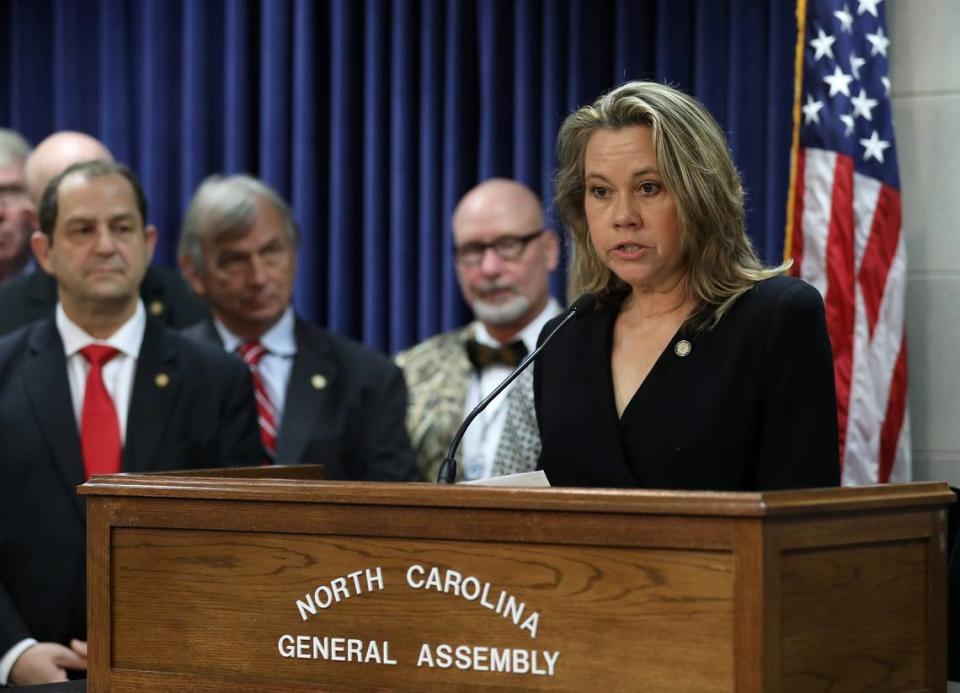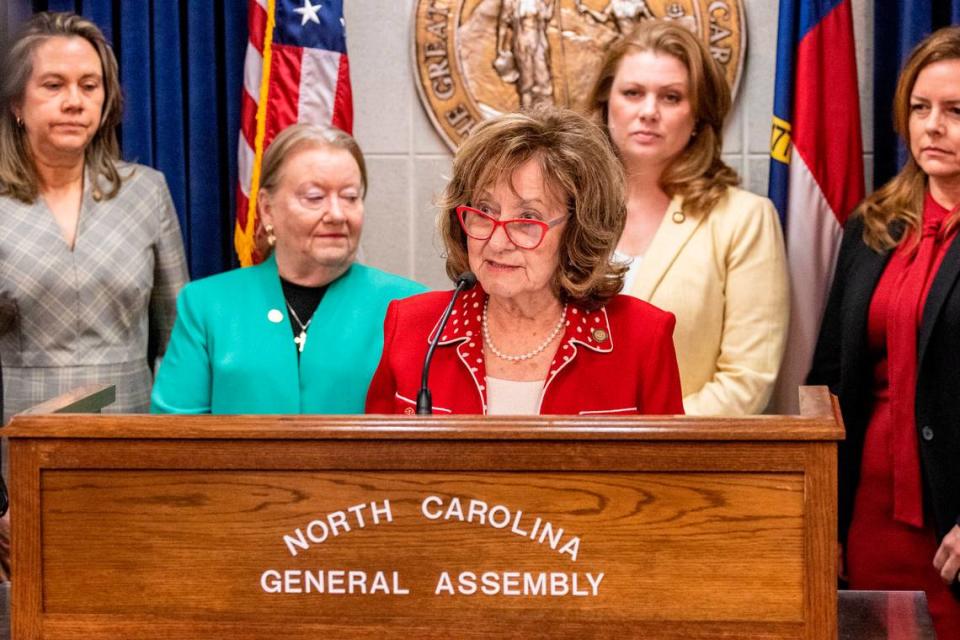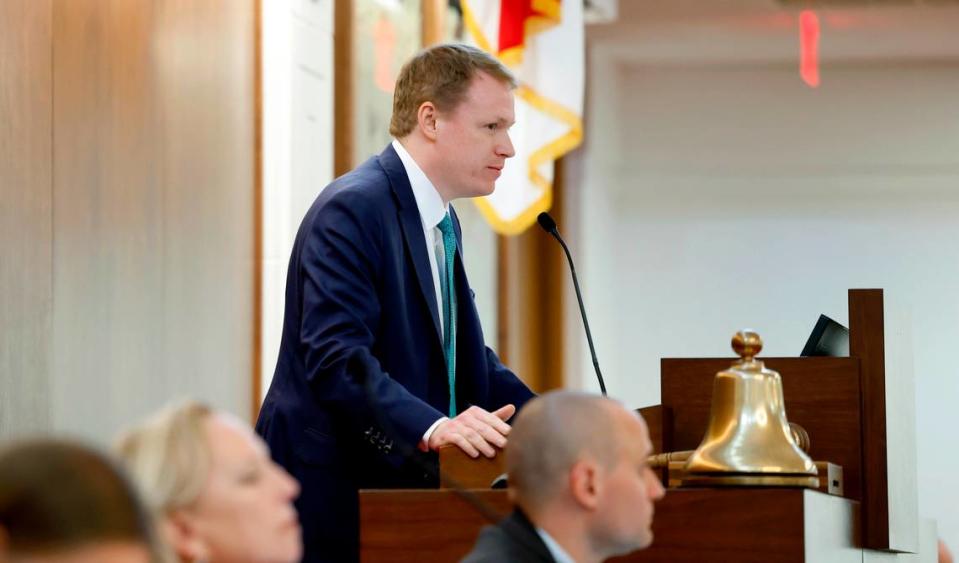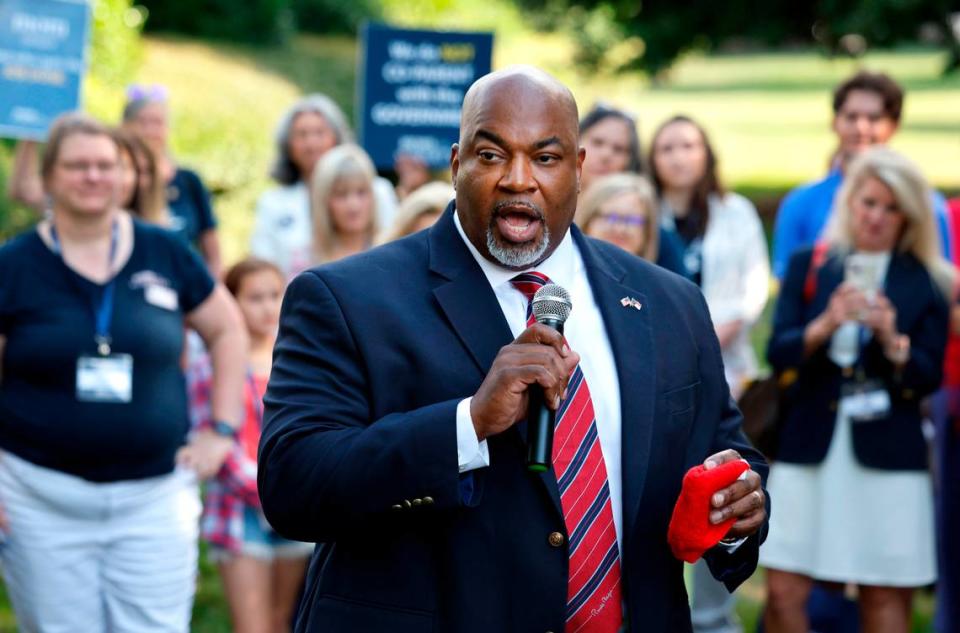Will NC abortion law change if Robinson wins as governor? It won’t be just up to him.
Who voters decide should be the next governor of North Carolina — Republican Lt. Gov. Mark Robinson or Democratic Attorney General Josh Stein — may also decide if there’s a new law further restricting abortion in the state.
The current state law banning abortion, with exceptions, after 12 weeks could be reduced to six weeks if Robinson is elected and state lawmakers send him the bill he wants. If Stein wins and Democrats gain even one seat in the legislature, they could block further changes.
But a governor can’t sign or veto a bill if state lawmakers don’t send them one. Right now, Republicans with power say they don’t want a new abortion bill, no matter who is governor.
“I completely expect somebody, some Republican in the General Assembly next year, will file a conception bill, and/or six-week bill,” Republican Sen. Amy Galey said. “But I would be surprised if that bill found any real traction.”
Robinson has said he would sign a “heartbeat” ban on abortion if lawmakers send him a bill, which means a ban at about five or six weeks gestation, when cardiac activity is first detected.
Stein, on the other hand, wants Roe v. Wade codified and said he would veto any bills that further restrict abortion. The current law bans abortions after 12 weeks, with exceptions up to 20 weeks for rape and incest; up to 24 weeks for a fetal anomaly; and at any time if “a qualified physician determines there exists a medical emergency.”
Republican women who negotiated the 2023 abortion bill
Republicans have a supermajority in the General Assembly, meaning enough votes to overturn a veto by the governor. But if the governor and the legislature are in the same party and on the same page, only a simple majority is needed in the General Assembly to send a bill to the governor to sign into law.
The movement of bills is controlled by the majority leadership in the chambers. That is expected to continue to be Senate President Pro Tempore Phil Berger, and in the House, Speaker Tim Moore’s heir apparent, current House Rules Chair Destin Hall.
In general, Republican leaders of the House and Senate only bring bills to the floor that have support from the vast majority of their caucuses.
Women Republicans were the key players at the table last year when they hashed out the Republican-written Senate Bill 20, which took effect July 1, 2023.
That includes Galey, who said her personal feelings on abortion are different than her role as a state senator representing the Burlington area. She said a 12-week ban is common-sense and reasonable, even though it’s not the time frame she would choose.

“I personally believe that life begins at conception,” Galey said in an interview with The N&O in her office at the legislature. “But I don’t represent a district of one, I represent a district of 205,000-210,000 people.
“I think that while the bill we passed last year may not be everything that people in the pro-life community would have wanted, I think it is appropriate for the state of North Carolina, considering our history and considering our culture. I think the bill we passed last year is appropriate for this state. And I would be surprised to see it surface again, in a meaningful way, during the long session next year,” she said.
Galey said that pro-life advocates should use their First Amendment rights to “make their case for why people should choose life.”
But she said that if Robinson wins, “a Gov. Robinson would have a hard time getting that bill on his desk to sign.”
Abortion access supporters predict Republicans ‘aren’t done yet’
Democrats have made abortion a key campaign issue, saying Robinson would ban abortion like some other Republican-controlled Southern states have.
North Carolina’s neighboring states’ abortion restrictions vary widely. Virginia law allows abortion up to 26 weeks of pregnancy, according to AbortionFinder’s state guide. South Carolina bans abortion, with exceptions, after about six weeks. Tennessee has a total ban, with very few exceptions.
State restrictions diverged after 2022, when the U.S. Supreme Court struck down Roe v. Wade, the decision that for nearly 50 years had guaranteed a right to abortion until a fetus could survive outside the womb, usually the third trimester.
That reignited a national debate on abortion and outraged many voters. Democrats see it as a winning issue in elections from the presidency down to the state level.

In April, Planned Parenthood and its affiliated groups announced a $10 million campaign to fund get-out-the-vote efforts ahead of November, with the goals of breaking the Republican supermajorities in the General Assembly and defeating Robinson. The investment is Planned Parenthood’s largest ever in North Carolina.
“We need to make sure that we elect a governor and lieutenant governor and attorney general and state legislature that supports access to abortion care,” said Jillian Riley, a spokesperson for Planned Parenthood South Atlantic. “In the state legislature, the current leaders are hell bent on interfering with private health care decisions, and making it harder for people to get reproductive health care that they need.”
“We know that they aren’t done yet,” Riley said.
“Anti-abortion extremists called Roe v. Wade “settled law” while actively working to overturn it, so I don’t put much faith or trust in any assurances that SB 20 is as far as Republicans will go to restrict access to reproductive healthcare,” said Rep. Julie von Haefen, an Apex Democrat.
Von Haefen said in a text message that GOP lawmakers have also “consistently lied about public support for their policies, despite the reality that a majority of North Carolinians opposed further abortion restrictions.”
She said that in the time since the bill was passed, North Carolinians haven’t changed their minds about it, pointing to a March poll by the left-leaning Public Policy Polling that found that 49% of North Carolina voters opposed the new GOP law, 36% supported it, and 15% said they were not sure.
Von Haefen also said that Republicans have refused to take up bills Democrats have filed to “codify the protections of Roe, protect access to contraception and IVF and address our increasing maternal (mortality) crisis.”
“This should tell voters all they need to know — the right to access abortion and reproductive healthcare in North Carolina is very much under threat and they should vote accordingly,” she said.
In an emailed statement, Stein told The N&O Robinson “has expressed support for a total ban on abortion ‘for any reason,’ says for him ‘there’s no compromise,’ and blames abortions on women not being ‘responsible enough to keep your skirt down.’”
“Abortion is an extremely personal decision that should be made by a woman, her family, and her doctor — not politicians in Raleigh and certainly not Mark Robinson,” Stein said. “As Governor, I will veto any further restrictions.”
Meanwhile, Mike Lonergan, a spokesperson for Robinson’s campaign, told The N&O that “the legislature has already spoken on this issue.”
“As governor, Mark Robinson will work to make North Carolina a destination for life by building a culture that does more to support women and families that choose life, including bolstering adoption, as well as foster and childcare,” Lonergan said in a text.
What Mark Robinson, candidate for NC governor, has said about abortion
A ‘reasonable’ law
Galey said abortion laws should reflect what Americans think is “reasonable.”
“We’ve got to talk in this country about when life begins. And when life is worthy of the protection of the law,” Galey said.
“Is it at conception? Is it when you hear the heartbeat for the first time? Is it at some amorphous point where a hypothetical baby could be able to survive outside the womb on its own? Under a given set of circumstances, whether or not the baby has access to a NICU? Or whether or not the baby was born in a rural place? Do we want a baby’s right to live to be dictated by their proximity to a major medical center? Is it that child’s right to life? Is it based on birth?”

“I think that the laws that we pass should be generally in some way reflective of the diverse and dynamic culture that we have in North Carolina,” she said. Galey said that “reasonable people can disagree.”
She said the current law is “not what I personally would choose, based on my own thoughts about when life begins, but I have respect for other people’s differences. And I can use my First Amendment rights to advocate for what I think.”
“But it’s really important that in the state, in this country, we put our dukes down, put our pitchforks and torches down, and have a reasonable discussion about, when does a baby become a person whose life is worthy of the protection of the law?”
Galey said that despite Robinson speaking at an anti-birth control group’s event, North Carolina Republicans are not trying to ban contraception, dismissing it as Democrats trying to create controversy.
Galey pointed to money in SB 20 that would fund money for contraception on a recurring basis. The law spends $3.5 million a year on competitive grants awarded to local health departments and nonprofit community health centers by the N.C. Department of Health and Human Services to provide long-acting, reversible birth control for patients who are “underserved, uninsured or medically indigent.”
Republicans in legislature follow polling
The News & Observer asked Sen. Vickie Sawyer, a Mooresville Republican and key player in the 2023 law, if she wanted another bill next session.
“No,” she said.
“I really am proud of Senate Bill 20 and what we did,” she said in an interview at her legislative office, noting the bill’s provisions for foster parents and funding birth control.
“I don’t think we’d get anywhere near that consensus ever again. I just don’t. I don’t see anything in the future that we would move legislation,” Sawyer said.
Other lawmakers may think differently, she said. But for her, the law is “right where people want us to be, and I don’t see — I have no will to reopen that.”

Sawyer, like Galey, said some Republican lawmakers may propose abortion bills. Any lawmaker can file a bill. But whether it moves is different.
Sawyer said Republicans she talks to aren’t talking about changing the law.
“And really, that’s founded in what North Carolinians are telling us, both through polling and what we hear from folks. We struck the right balance with Senate Bill 20. And it looks like we hit the majority of what folks had asked for, plus helping women with, you know, all kinds of other things like family leave — those good things in the bill that nobody ever talks about” because of the focus on restrictions, Sawyer said.
She said that lawmakers have to govern “for everybody, not just for one.”
She also pointed out Berger’s position; as Senate leader, Berger can control what legislation comes to the floor.
“I just don’t see how anything will change. Although I know, and totally, completely understand why Democrats want to say that it will: the sky is falling for women’s rights, and, women’s health care and all this other stuff. They’re gonna continue to gin that up, and I get that. That’s what they’re supposed to do — the loyal opposition. They’re trying to pick up seats and break a supermajority,” she said.
She acknowledged that Robinson also continues to talk about abortion, however.

Another Republican who helped negotiate last year’s abortion bill, Rep. Erin Paré of Holly Springs, also told The N&O she felt the 12-week timeframe GOP lawmakers settled on was a “reasonable” compromise that Republicans had the votes to pass, and is supported by the majority of North Carolinians.
Paré said that as a matter of personal belief, she’s “always been pro-life” and “always will be pro-life,” and strongly believes in the need to “prioritize the preservation of human life.”
At the same time, she said she feels it’s important that lawmakers, “as representatives of the people, understand where the majority of North Carolinians are on this issue,” which she said matches the bill the GOP passed last year.
Paré pointed to an April poll released by GOP-affiliated groups Carolina Leadership Coalition and Carolina Partnership for Reform, which found 27% of registered voters supported keeping the 12-week ban in place, 17% supported restoring the 20-week ban that was previously in place, 20% supported no restrictions at all, 16% supported a six-week ban, and 13% supported a full ban. Six percent said they didn’t know which option most closely matched their opinion.
Berger, an Eden Republican, is expected to handily win reelection. He has been the Senate leader since Republicans took control a dozen years ago. While Republicans strategically put women lawmakers at the front of the intraparty abortion negotiations, the final bill still landed about where Berger had suggested in 2022 was his preference: 12 weeks with exceptions.
As The N&O reported in June, Berger doesn’t want any new abortion legislation in 2025.
“I personally would not be in favor of making any changes next year. We will see what happens as far as the election, and what the majorities look like in both the House and the Senate next year. And we’ll just see what happens. I can just speak to where I am,” he said, noting that other senators may think differently.

Berger said that there are Republican lawmakers who support “heartbeat” legislation. But he also pointed out what polling shows.
“One of the things that I’ve looked at is where the vast majority of people in the state of North Carolina are. And I’ve yet to see any polling that shows that prohibiting abortions, or having a six- or eight-week time frame, is something that enjoys support of a majority of people in the state of North Carolina — or a majority of voters in the state of North Carolina. And it’s, I mean, it’s not even close,” Berger said.
Some top lawmakers personally support heartbeat bill
Over in the House, top Republicans are backing Hall, a 36-year-old attorney from Lenoir, to succeed Moore as the next speaker, and leader of their caucus.
First elected in 2016, Hall quickly ascended the leadership ranks, receiving an appointment as co-chair of the Rules Committee in 2020, and months later, becoming sole chair, a role in which he decides which bills will ultimately move forward to the House floor.
In an interview, Hall said that when it comes to any potential new abortion legislation, House Republicans will need to see what their caucus looks like when lawmakers convene for the long session in 2025.
Several lawmakers are retiring at the end of this year, and some chose not to run for reelection, or ran for other elected offices, which means there will be many newcomers.
“I think that both our current caucus, and I imagine the next caucus, will certainly see our current law that we passed as being a reasonable compromise, protecting life in this state, while at the same time heavily investing in maternal care, making it easier financially, for folks to have children,” Hall told The N&O.

As with every other issue lawmakers act on, however, Hall said it’ll be vital for Republicans to “pay close attention to where the citizens of North Carolina are.”
“We’ll learn a lot from the elections this fall,” Hall said. “Part of that is, what composition do the voters of this state send to Raleigh, for the General Assembly, for the two-year term. We’ll be watching those things closely, and that’s certainly a critical data point for us: Where are the citizens of this state, on every issue, not just this one.”
Hall said that he personally supports the heartbeat bill that some Republicans wanted to pass last year.
“That doesn’t mean that’s where our caucus is going to be,” Hall said.
Moore also said last year that he personally supported a heartbeat bill, but told activists who were urging GOP lawmakers to settle on a six-week ban at the time that he wanted to pass something that could be enacted over Gov. Roy Cooper’s veto.
Social conservatives urge lawmakers to go further
One of the leading voices calling on lawmakers to take further action to restrict abortions is the N.C. Values Coalition.
While it was a major supporter of the law Republicans enacted last year, the group had originally pushed GOP lawmakers to get behind a heartbeat bill.
“It’s no secret that the North Carolina Values Coalition believes that life begins at conception,” the group’s executive director, Tami Fitzgerald, said in an interview. “We want to protect as many unborn babies as possible.”
Fitzgerald said that despite lawmakers enacting a stricter law, there has been a “horrific increase” in abortions being performed as people from surrounding states with more restrictive laws have come to North Carolina, where the law hasn’t “kept up.”
She also pointed out that the vast majority of abortions take place before 12 weeks of gestation. State data for 2021, before the new law went into effect, showed that nearly 90% of the abortions performed that year took place in the first 12 weeks, with around 71% occurring in the first 8 weeks, and about 19% occurring between 9 and 12 weeks, The N&O reported last year.
“Ultimately, we’d like to see abortion become unthinkable for women, and we believe that one of the ways that happens is that women are offered other alternatives,” Fitzgerald said.
Fitzgerald said that many women who have abortions “say that if their circumstances were different, they would choose life.”
“We want to focus on making that possible, for women to choose life, making it the largest option they have, instead of the last option they have,” she said.

Looking ahead to next year’s legislative session, Fitzgerald said that the Values Coalition’s lobbying will depend on “how many more pro-life supporters get elected to the General Assembly” in November, and who wins the governor’s race.
The “obvious advantage” of Robinson winning, Fitzgerald said, is that Republicans would no longer have to override a veto on any new restrictions.
That could mean not having to secure support from the entire caucus, since bills could be passed and signed into law by simple majorities.
Hall said it’s difficult to say how the outcome of the governor’s race could affect how Republicans approach legislation next year, since it depends not just on how many seats the GOP wins, but “the actual members who are filling those seats.”
He also said that even though Republicans currently need every one of their caucus members to support bills that will be vetoed, there’s no requirement that “every bill has to have unanimous support from every member of our caucus.”
The threshold House GOP leaders follow now before moving forward with bills is backing from at least a majority of the caucus.
Hall said no matter how many members the caucus has, they “are still concerned with what the best policy is for the people of this state.”
But there’s “no question that it’s easier to get things passed when we have a governor who we’re confident is going to sign a given bill that we pass,” Hall said.
Under the Dome
Get the latest news about North Carolina politics from The News & Observer's award-winning team. Get the free digest sent to your inbox by signing up here.


